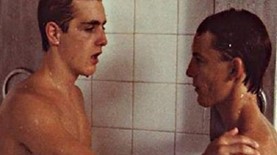The screenings, which form part of the BBC centenary celebrations, combine rare archival footage from the 1970s and 1980s with live discussions between participants in the original programmes and the events they covered.
On 10 September, the creators of the ground-breaking drama Two of Us (1988) discuss how a film made for schools about love between two teenage boys came to be broadcast the very day after the Thatcher government forbade teachers from promoting ‘the acceptability of homosexuality as a pretended family relationship’.
The screening shows footage excised from the version originally broadcast by the BBC and will feature the show’s producer Roger Tonge, writer Leslie Stewart, actor Jason Rush and Stephen Bourne, author of Playing Gay in the Golden Age of British TV.
On 17 September, we revisit 1977, the year when Mary Whitehouse brought a private prosecution for blasphemous libel against Gay News.
The screening includes Blasphemy at the Old Bailey, a dramatisation of the trial not screened since its original broadcast almost half a century ago. Journalists from Gay News, leading figures in the lesbian and gay Christian movement and barrister Geoffrey Robertson, who defended Gay News in court, will reassess this celebrated showdown between the forces of gay liberation and moral conservatism.
On 24 September, the focus is on Julia Grant and Jan Morris. Though different in almost every respect, they shared the fate of being trans women who exposed their private lives to public view in the harsh climate of 1970s Britain.
This screening includes a brutal grilling of Jan Morris chaired by Robin Day in which her identity is challenged on psychiatric, Freudian and feminist grounds. Director David Pearson and members of Julia Grant’s family will discuss how A Change of Sex reversed perspective by making a trans woman the subject of a series rather than an object of examination.
The season is being curated by Dr Marcus Collins, Reader in Contemporary History at Loughborough University, AHRC BBC 100 Fellow and author of the forthcoming book, Arrested Development: Homosexuality and Broadcasting from Wolfenden to AIDS.
He said: “This season illustrates why LGBTQ+ issues created any number of dilemmas for the BBC from the 1950s onwards.
“The BBC first had to overcome its original aversion to discuss anything to do with sex, then it had to grapple with how to square its dedication to balance and public service with the competing claims of a wide array of groups, from gay activists to evangelical Christians.
“Some of the decisions made by the BBC in the seventies and eighties appear strange from the perspective of the twenty-first century, but the programmes were nonetheless instrumental in shaping how lesbian, gay and trans people perceived themselves and how they were perceived by the wider British public.”
Free tickets for all screenings are available from the Cinema Museum at http://www.cinemamuseum.org.uk/topics/events/.
Media interviews with participants in the discussions can be arranged by emailing Dr Collins at marcus.collins@lboro.ac.uk
ENDS

